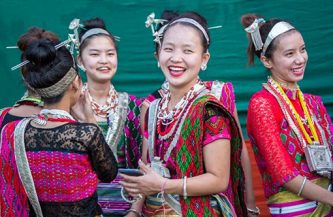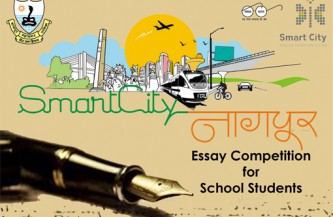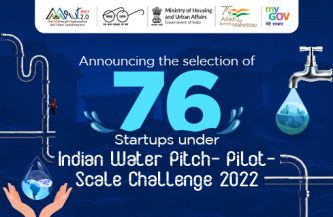Digital India – The Vision and the Mission

The Prime Minister Shri Narendra Modi has envisioned the ‘Digital India’ programme to transform India into a digitally empowered society and a knowledge economy. The Programme symbolizes the Government of India’s vision for connecting and empowering 125 crore citizens; creating unprecedented levels of transparency and accountability in governance; and leveraging technology for quality education, health care, farming, financial inclusion and empowering citizens. Under the ‘Digital India’ Programme, technology will play a central role to achieve easy, effective and economical governance.
The ‘Digital India’ Programme was presented to the Union Cabinet on 20th August, 2014 and was formally launched by Hon’ble Prime Minister on 1st July, 2015. The programme is centered around three key areas, namely, Digital Infrastructure to every citizen, Digital services & governance on demand and Digital empowerment of citizens.
Several initiatives envisioned under the programme have been implemented and many are under implementation. Some prominent achievements of Digital India are:
- MyGov Platform – This unique platform for citizen engagement in governance has been implemented as a medium for citizens to exchange ideas/ suggestions with the Government. Through this platform, the Government of India gets feedback, inputs, advice and ideas from citizens for policy decisions, new initiatives like Digital India, Swachch Bharat, Clean Ganga, Make in India, Skill Development, etc. MyGov is growing steadily, with over 15.8 lakh users already registered, and over XX million page views. MyGov has conducted over 750 activities and is receiving more than ten thousand (10,000) posts per week on various issues. MyGov has also played a key role in reaching out to citizens for the Smart Cities Mission and has facilitated consultations up to the Gram Panchayat and Municipalities levels for the design of the New Education Policy.
- Jeevan Pramaan – Pensioners can now conveniently submit their life certificates online through this portal. The certificates are stored in the Life Certificate Repository for making it available anytime & anywhere for pensioners and the Pension Disbursing Agencies. Over eight (8) lakh pensioners are already registered on this portal.
- e-Greetings Portal – is being used to send e-Greetings by Government departments on various occasions like Gandhi Jayanti, Diwali, Teacher day, Independence day, etc. Over 10 lakh e-Greetings have been sent through this portal. Over 42 greeting categories and 450 cards are available on the portal to send greetings in electronic form. Interestingly, all the greetings have been created by crowdsourcing inputs through MyGov contests, allowing India’s creative talent to bloom. It also serves as an ecofriendly method of sharing joy and good wishes with friends and family.
- eBooks Platform (eBasta) – is an electronic platform of e-Books for schools. Currently, 501 e-Contents and 15 eBasta (collection of books) are available on this platform.
- Digital Locker System – ensures that citizens are not asked to provide documents/certificates, which are already available with some department/institution of the government. Currently, over ten (10) lakh digital lockers have been opened where citizens have self-uploaded over 11.8 lakh documents and 52.09 lakh documents have been issued. Government Departments are being assisted to onboard/integrate them with the Digital Locker.
- e-Sign – would facilitate digitally signing a document through online authentication mechanism. So far, 1.75 lakh e-Signatures have been issued. e-Mudhra and CDAC are empanelled to offer e-Sign services.
- e-Hospital – aims to reduce the anxiety of patients and their attendees by making available various online services such as appointment, accessing diagnostic reports, payment of fees and enquiring blood availability, etc. e-Hospital is currently functional in four (4) Central Government hospitals namely AIIMS, Dr. RML Hospital, Safdarjung & NIMHANS hospitals, and being implemented in 11 major Central Government hospitals.
- National Scholarships Portal – provides a centralized platform for application, approval and disbursement of scholarships to students under any scholarship scheme. Over 67 lakh applications have been submitted on this portal for 19 registered scholarship schemes of 7 Ministries / Departments. The goal is to bring all scholarship schemes under this portal.
- Digitize India Platform – allows government organizations in the country to digitize its records and documents through contributions of ordinary citizens. So far, through over 14,088 contributors; 2.6 lakhs documents & 24.1 Lakh snippets have been utilized for digitization.
- Approval of new Mission Mode Projects – Thirteen new Mission Mode Projects (MMPs) have been approved to offer citizens a wider range of electronic services. These MMPs include Financial Inclusion, Rural Development, Social Benefits, e-Sansad, e-Vidhaan, Agriculture 2.0, Roads & Highways Information System (RAHI), Central Armed Para Military Forces (CAPF), Women & Child Development, National Mission on Education through ICT (NMEICT), National GIS (NGIS), e-Bhasha and Urban Governance.
- Policies/Schemes announced – Several policies related to Software development, Electronic services and promotion of Electronic Manufacturing have been announced that include –
- Policy & Framework on adoption of Open Source Software for GoI
- Policy on Open APIs for GoI
- Policy on collaborative application development by opening source code of Govt. applications
- Application development and re-engineering guidelines for cloud-ready applications
- Electronics Development Fund – It has been created and is being housed with M/s Canbank Venture Capital Fund Ltd to support venture capital funds which will in turn fund start ups.
- Electronic Manufacturing Cluster Scheme – To support creation of world-class infrastructure, in-principle approval to 18 clusters and final approvals to 5 clusters have been accorded.
- Visvesvaraya PhD Scheme for Electronics and IT – So far, 1436 PhDs in addition to 11 Young Faculty Research Fellowships have been supported, with the motive of promoting R&D and innovation in Electronics and IT.
- Policy & Framework on adoption of Open Source Software for GoI
- Policy on Open APIs for GoI
- Policy on collaborative application development by opening source code of Govt. applications
- Application development and re-engineering guidelines for cloud-ready applications
- Electronics Development Fund – It has been created and is being housed with M/s Canbank Venture Capital Fund Ltd to support venture capital funds which will in turn fund start ups.
- Electronic Manufacturing Cluster Scheme – To support creation of world-class infrastructure, in-principle approval to 18 clusters and final approvals to 5 clusters have been accorded.
- Visvesvaraya PhD Scheme for Electronics and IT – So far, 1436 PhDs in addition to 11 Young Faculty Research Fellowships have been supported, with the motive of promoting R&D and innovation in Electronics and IT.
- Rural BPO Scheme – To facilitate ICT enabled employment generation throughout the country, BPOs would be set up in the north-eastern states under North East BPO Promotion Scheme ( around 5000 seats ) and in Tier II and Tier III cities of the country under the India BPO Promotion Scheme ( over 48,000 seats ). The India BPO Promotion Scheme will create an employment opportunity for about 1,45,000 persons. In the Expression of Interest issued, 78 companies have shown interest for 1,25,000 seats in 190 locations of the country.
- Common Service Centres – In the last 18 months, CSCs operating as front end service delivery outlet in rural areas has increased from 1.34 lacs to 1.44 lacs. The total transacting CSCs increased from 63433 to 94455 providing e-gov services to the citizens. CSCs acting as Banking Correspondents increased from 11244 to 27652, which are making around 1.36 crores transactions in a month, through which, in the last 6 months, CSCs have earned a commission of Rs 23 crores. CSCs are also working with 15 Insurance companies, doing a premium collection of Rs 70 lakhs per day.
My wish is to see CSCs being run by digitally literate Mahadalit women, delivering the e-gov services. Recently, we could make 300 Mahadalit women of Gaya district of Bihar, digitally literate to deliver e-gov services through CSCs in the rural areas. - National Digital Literacy Mission – aims to provide IT training to enable the citizens to use IT and related applications for their livelihood earning and employability has been approved. The Scheme was launched by Hon’ble Prime Minister at Ranchi, Jharkhand on 21st August, 2014.
- DISHA (Digital Saksharta Abhiyan) – has objective to make additional 42.5 lakh persons digitally literate in a period of four years. Under the Disha and National Digital Literacy Mission, 12.25 lakh persons have been trained and 4.75 lakh candidates have been certified (by NIELIT).
- Upsurge in Make-in-India in Electronics – So far, under the Modified Special Incentive Package Scheme (M-SIPS), DeitY has received 156 proposals with investment of over Rs. 1 lakh 13 thousand crores. Many major well known brands have submitted their applications under this scheme, to avail the benefits. This policy has been made more investor friendly and extended for five years up to July 2020.
- Revamping of Existing Mission Mode Projects (MMPs) – Some of the existing MMPs were developed many years ago. Their software applications are being assessed and revamped by leveraging new technology platforms, such as Cloud, Mobile, GIS, etc., to facilitate delivery of integrated services involving multiple departments, and enhance the quality of services that can efficiently cater to the needs of citizens.
It has been the endeavor of this government to empower the citizens of this country in a way unlike ever before. We are fortunate that the advances in digital technology, much of which is being led by Indians, has given us the space and platform to achieve this. My ministry and I will personally devote our best efforts to achieve the vision and mission that Prime Minister Shri Narendra Modi has given to us.
Ravi Shankar Prasad is Union Cabinet Minister for Communications and Information Technology.
ol li{padding:5px;}





